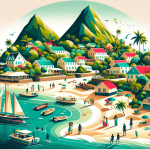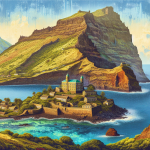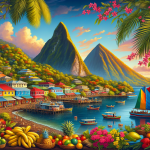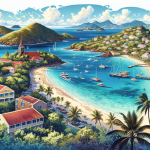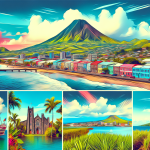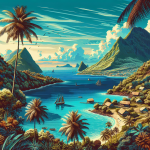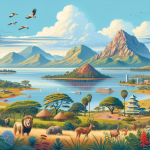Discovering Senegal: A Vibrant Journey Through West Africa
Senegal, a captivating country nestled in West Africa, offers a rich tapestry of culture, history, and natural beauty. From its bustling cities to serene coastal landscapes, Senegal beckons travelers with its warm hospitality and diverse attractions. This journey through Senegal promises an exploration of its unique heritage, vibrant cities, and breathtaking natural wonders. Whether you’re a history enthusiast, a nature lover, or someone seeking a new cultural experience, Senegal has something to offer. Let’s delve into the wonders of Senegal and uncover why this destination should be on every traveler’s bucket list.
Exploring Dakar: The Heartbeat of Senegal
Dakar, the capital city of Senegal, is a lively metropolis that serves as the gateway to the country. Known for its dynamic arts scene, bustling markets, and historic landmarks, Dakar is a city that never sleeps. The city’s vibrant energy is palpable as you wander through its streets, discovering a blend of modernity and tradition.
Gorée Island: A Glimpse into History
Just off the coast of Dakar lies Gorée Island, a UNESCO World Heritage site that holds a significant place in history. The island, once a major center of the Atlantic slave trade, stands as a poignant reminder of a dark past. Today, visitors can explore the Maison des Esclaves (House of Slaves), a museum that provides a sobering look at the realities of slavery. The island’s cobblestone streets, colonial buildings, and stunning views of the Atlantic Ocean offer a stark contrast to its historical significance.
Îles de la Madeleine: A Natural Refuge
For those seeking a natural escape, the Îles de la Madeleine, a small archipelago just off the coast of Dakar, is a must-visit. These islands are part of the Îles de la Madeleine National Park, known for their unique flora and fauna. A boat trip to these islands offers opportunities for bird watching, hiking, and enjoying the serene beauty of the Atlantic coastline. The islands’ rugged landscapes and clear waters provide a perfect retreat from the bustling city life of Dakar.
Saint-Louis: A Cultural and Historical Gem
Located at the mouth of the Senegal River, Saint-Louis is a city steeped in history and culture. Founded in the 17th century by French settlers, Saint-Louis is one of the oldest colonial towns in West Africa. Its well-preserved colonial architecture and vibrant cultural scene make it a fascinating destination for travelers.
Colonial Architecture and Cultural Festivals
The historic center of Saint-Louis, another UNESCO World Heritage site, is characterized by its colonial-era buildings and narrow streets. The city’s unique blend of French and Senegalese influences is evident in its architecture, cuisine, and cultural traditions. Saint-Louis is also known for its lively festivals, such as the Saint-Louis Jazz Festival, which attracts musicians and jazz enthusiasts from around the world. These events provide a glimpse into the city’s rich cultural heritage and vibrant community spirit.
Langue de Barbarie National Park: A Natural Haven
Nature enthusiasts will find solace in the Langue de Barbarie National Park, located near Saint-Louis. This protected area is home to a diverse range of bird species, making it a popular spot for bird watching. The park’s scenic landscapes, including sand dunes, wetlands, and the Senegal River, offer a tranquil setting for outdoor activities such as kayaking and hiking. The park’s rich biodiversity and stunning natural beauty make it a must-visit for nature lovers.
Casamance: Senegal’s Untamed Wilderness
Casamance, the southern region of Senegal, is renowned for its lush landscapes, pristine beaches, and vibrant cultural traditions. This region offers a stark contrast to the arid northern parts of the country, with its verdant forests, winding rivers, and abundant wildlife.
Exploring Cap Skirring: A Coastal Paradise
Cap Skirring, a coastal town in Casamance, is a popular destination for beach lovers and adventure seekers. The town’s stunning beaches, lined with palm trees and golden sands, provide the perfect backdrop for relaxation and water sports. Visitors can indulge in activities such as swimming, snorkeling, and fishing. The town also offers a glimpse into the local Jola culture, with traditional music and dance performances that showcase the region’s rich heritage.
Niokolo-Koba National Park: A Wildlife Adventure
For an unforgettable wildlife experience, a visit to Niokolo-Koba National Park is essential. This UNESCO World Heritage site is one of the largest national parks in West Africa, covering over 9,000 square kilometers. The park is home to a diverse range of wildlife, including elephants, lions, hippos, and various bird species. Safari tours offer the chance to observe these animals in their natural habitat, providing a thrilling adventure for nature enthusiasts. The park’s diverse ecosystems, including savannas, forests, and wetlands, make it a haven for wildlife and a paradise for photographers.
Senegal’s Cultural Heritage: A Tapestry of Traditions
Senegal’s rich cultural heritage is a reflection of its diverse ethnic groups, each with its own unique traditions and customs. The country’s cultural landscape is characterized by vibrant music, dance, and art forms that have been passed down through generations.
Music and Dance: The Heartbeat of Senegalese Culture
Music and dance are integral parts of Senegalese culture, with genres such as mbalax, a fusion of traditional Sabar drumming and modern influences, gaining international recognition. Senegalese musicians like Youssou N’Dour have brought the country’s music to a global audience, showcasing the rhythmic beats and soulful melodies that define Senegalese music. Dance is also a vital aspect of cultural expression, with traditional dances performed at celebrations, ceremonies, and festivals. These performances are a vibrant display of the country’s cultural diversity and artistic talent.
Art and Craft: A Celebration of Creativity
Senegal’s art scene is a vibrant reflection of its cultural diversity and creativity. The country’s artisans produce a wide range of crafts, including textiles, pottery, and jewelry, each piece telling a story of cultural heritage and artistic expression. The Village des Arts in Dakar is a hub for contemporary Senegalese art, where visitors can explore galleries and meet local artists. Traditional crafts, such as the colorful fabrics of the Toucouleur people and the intricate beadwork of the Serer, offer a glimpse into the rich artistic traditions of Senegal’s various ethnic groups.
Practical Tips for Traveling in Senegal
Traveling in Senegal offers a rewarding experience, but it’s essential to be prepared to make the most of your trip. Here are some practical tips to help you navigate the country and ensure a smooth journey.
Health and Safety
Before traveling to Senegal, it’s important to check the latest health and safety recommendations. Ensure you have the necessary vaccinations and take precautions against malaria, which is prevalent in some regions. It’s also advisable to drink bottled or purified water and practice good hygiene to avoid foodborne illnesses. While Senegal is generally safe for travelers, it’s always wise to stay informed about local conditions and follow any travel advisories.
Transportation and Accommodation
Senegal has a well-developed transportation network, with options ranging from domestic flights to buses and taxis. For longer journeys, consider flying with local airlines to save time. Within cities, taxis are a convenient and affordable way to get around, but it’s essential to agree on the fare before starting your journey. Accommodation options in Senegal vary from budget guesthouses to luxury hotels, catering to different preferences and budgets. Booking in advance, especially during peak travel seasons, ensures you have a comfortable place to stay.
Language and Communication
While French is the official language of Senegal, many locals speak Wolof, the most widely spoken indigenous language. Learning a few basic phrases in Wolof can enhance your travel experience and help you connect with the local community. English is not widely spoken, so having a language app or phrasebook handy can be useful for communication. Senegalese people are known for their hospitality, and making an effort to speak the local language is often appreciated.
Conclusion: Embrace the Spirit of Senegal
Senegal is a country that captivates the senses with its vibrant culture, rich history, and breathtaking landscapes. From the bustling streets of Dakar to the serene beaches of Casamance, every corner of Senegal offers a unique experience. The country’s warm hospitality and diverse attractions make it a destination that leaves a lasting impression on all who visit. Whether you’re exploring historical sites, immersing yourself in local traditions, or embarking on a wildlife adventure, Senegal invites you to embrace its spirit and discover the beauty of West Africa. Plan your journey to Senegal today and experience the magic of this extraordinary country.
